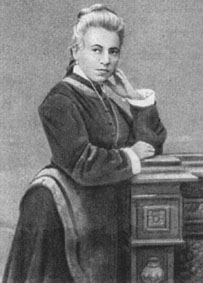
undefined
undefined
Prominent Poles
Eliza Orzeszkowa (born Eliza Pawlowska, after second husband Eliza Nahorska), novelist, Nobel Prize nominee

Born: June 6, 1841, Milkowszczyzna near Grodno, Russian partition of Poland, (presently Hrodna, Belarus)
Died: Died: May 18, 1910, Grodno, Russian partition of Poland, (presently Hrodna, Belarus)
Summary. She was the first to call for realism in her work O powieściach T. T. Jeża 1878. She was in favor of enterprise, diligence, educating sons of the gentry in urban professions, breaking with upper-class snobbism, social justice and equality for women, their right to a legal divorce if marriage proved a failure, preparation for practical professions, just wages for their work. She declared war on anti-Semitism sooner than others.
Early days. Father, Benedykt Pawlowski, coat of arms Korwin, a wealthy attorney and landowner; mother- Franciszka Kamienska. Eliza did not enjoy a carefree childhood as her mother - a very pretty woman and an exalted patriot but very strict as far as etiquette was concerned - did not find it easy to show her feelings to her daughter, and later she would not view her daughter�s literary aspirations with an approving eye. From Milkowszczyzna young Eliza went to Warsaw to the boarding school for young girls, run by the nuns of the Order of the Holy Sacrament, where she became friends with Maria Wasilowska (Maria Konopnicka, later a famous writer) to come back having finished 5 years of education. At the boarding school she learnt French and German and acquired some secondary-level general knowledge. However, the vast remainder resulted from her self-education and her father�s library, full of works by Enlightenment writers. It is hard not to admire the phenomenon of Orzeszkowa, if we consider that despite the fact that she was working in the provinces, far from the intellectual centers, and, being a woman, did not stand a chance of obtaining a higher education, she became the pioneer of Polish Positivism.
Her marriages. At the age of 17 she married Piotr Orzeszko (twice her age) and moved to his estate in Ludwin�w. Orzeszkowa�s marriage proved to be a financial transaction and she soon became disappointed in the man who steered clear of her educational work among local folk and who would not get involved in any patriotic conspiracy. She actively participated in the January Uprising by taking charge of a "field hospital" for the underground insurgent troops, and by helping Romuald Traugutt, the last dictator of the January Uprising, to cross the border into the Kr�lestwo. In 1863, her husband as a result of her conspiratorial activities was reported by the servants and sentenced to exile and his estate was confiscated. And although he was sent into exile, she left him and, when she fell in love with Dr. Święcicki, she applied for the marriage to be annulled. It was annulled in 1869 but her beloved could not decide to marry her. Orzeszkowa therefore moved back to the Grodno area. Then another drama: her feelings for Stanisław Nahorski, a lawyer in Grodno, who was married to a seriously ill woman. This led to Orzeszkowa being ostracized until 1885 when, after the fire of Grodno, she, deprived of her own house, became the organizer and distributor of help for the thousands of victims of the fire. She could marry Nahorski only in 1894 when his wife died.
Literary career. She presented her literary program in the essays Kilka uwag nad powiescia 1866; O przekładach , 1972; Listy o literaturze 1873. She strongly believed in evolutionism and agnosticism. She was the one to initiate the debate on women�s emancipation- the study Kilka słï¿½w o kobietach 1870, the novel Marta 1876 (translated into 15 languages). Orzeszkowa came into contact with Jews and studied Jewish history, culture and religion, which resulted in numerous works: the short stories Daj kwiatek , Silny Samson 1877 and Gedali 1884, the novels Eli Makower 1875 and Meir Ezofowicz 1878 (translated into 13 languages), the essay O Żydach i kwestii żydowskiej 1882, the historical novel Mirtala 1886. In her novels on the life of the people from Belarus, close to naturalistic studies "from nature", she depicted the social dramas of her times. In Niziny (1884) she presented the tragedy of a grange worker. In Dziurdziowie (1885) she described an atrocious crime, committed by drunken superstitious peasants on a women suspected of witchcraft. In Nad Niemnem 1887 ("On the Banks of the Niemen "), she presented the panorama of the landowners and the impoverished yeomanry. In the second outstanding novel - Cham ("The Boor ") 1888 � which tells a story of love and mercy, but also of the tragedy of alienation, the victim of which is a neurasthenic woman, infected by the miasmas of civilization. During the last fifteen years she wrote Bene nati 1891, Dwa bieguny 1893, Pieśń przerwana 1894, Australczyk 1895, Argonauci 1899 and Anastazja 1902, the "correspondence dialogue" Ad astra (1903 - written in collaboration with Tadeusz Garbowski) and a few collections of short stories (Melancholicy 1896, Iskry 1898, Chwile 1901, Przędze 1903). In 1899 she condemned Conrad for imparting his "creative ability" to an already abundant England. In 1905 together with Sienkiewicz and Lev Tolstoy she was nominated for the Nobel Prize for Literature. The prize was awarded to Sienkiewicz. In 1910 she wrote Gloria victis that expressed her faith in the purpose of a fight for virtuous aims, even though the fight does not end in victory.
Sources:
This article uses, among others, material from the Wikipedia article "Eliza Orzeszkowa" licensed under the GNU Free Documentation License. :
Wikipedia (in Polish) List of works
University of Glasgow
Gloria victis and Nad Niemnem (in Polish)
University of Gdansk (UNESCO) Public domain
English translations of some of her works:
Constance J. Ostrowski
Return to home page:
Prominent Poles
